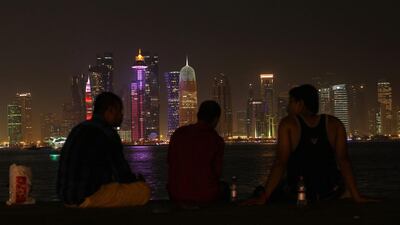ABU DHABI // Residents of Qatar are waiting with growing trepidation for the full effects of sanctions by other Gulf states to take hold.
Shoppers cleared supermarket shelves of produce just hours after the UAE and Saudi Arabia announced the closure of land, sea and air routes to the emirate two weeks ago.
For a country that imports 90 per cent of its food, much of it through a single land crossing with Saudi Arabia, the impact was immediate.
The panic buying has eased since then thanks to imports from Turkey and residents have adapted to the changes, but they fear further shortages of food and worry that the situation will deteriorate after Ramadan.
The American owner of a restaurant chain with outlets in Doha and across the GCC said produce from Turkey and Kuwait had been filling the gaps in the market, but she feared there could be more supply problems as there were no signs of an end to the crisis.
To avoid price increases, Qatar’s ministry of economy and commerce has been forced to subsidise about 50,000 food products.
Fresh food in particular has been affected as the bulk of Qatar’s fruit and vegetable imports were brought in by road through the Abu Samra border crossing between Qatar and Saudi Arabia.
Along with imports from alternative sources, there has been an attempt to increase supplies of local produce, but because there are no price caps on Qatari food, the costs are high. And the level of local food production is still far short of demand.
“Practically all groceries, albeit different brands, are available, but some foodstuffs have gone up in price,” said Tawfiq Raji, 26, a Canadian who works in Qatar.
“Different restaurants are also more frequently sold out of menu items, so that has a slight detrimental effect on restaurant owners.”
In the shops and supermarkets, food imported from Saudi Arabia and the UAE before the break in ties on June 5 is still on the shelves approaching its expiry date.
Some residents said life had continued as normal because of the routines of Ramadan, in particular consumer habits and shortened work hours.
“The population is generally less active during this time, so you wouldn’t notice that common staples are missing,” said Mr Raji.
The American restaurant owner said she had noticed a drop in the number of people in the malls and less spending generally. She said people favoured prudence.
“The only thing that has suffered is people’s confidence that they will have a job a few months from now, or enough money to leave with if they have to, so some spending has declined,” she said.
Mr Raji said he expected the construction sector, in which he works, to be affected if the GCC dispute continued. Much of the building material used in Doha’s construction boom and World Cup projects is also transported across the Saudi border.
“This will definitely affect the future of the country as there will be numerous delays faced by many contractors. This will in turn lead to delayed payments, which could lead to bankruptcy for smaller companies,” he said.
Another issue raised by a Briton who recently moved to the country is the lack of an easy visa-run destination.
“We used to go to Dubai, there was something like two or three flights an hour. We’d pop in and out within a day, maybe meet up with some mates while we’re at it,” said the 37-year-old who is in Doha on a visit visa while looking for a job.
Now, he said, expats are forced to go to Oman or Kuwait on more expensive flights and at less convenient times.
nalwasmi@thenational.ae

